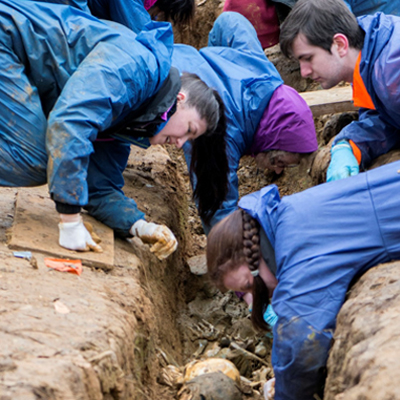Our staff have expertise in the recovery and analysis of human skeletal remains from different time periods and contexts, ranging from prehistory to the 19th century, in addition to humanitarian and forensic work. We specialise in the identification of the deceased, the analysis of cremated bone, mass grave investigations, disease in the past, trauma analysis and ethics amongst other areas of interest. As a close-knit team of academic and technical staff which are nationally and internationally recognised, with extensive experience of both professional and academic practice within forensic sciences, archaeology, and biological anthropology, we are actively engaged in research in the following areas:
Human bioarchaeology
Aspects of human bioarchaeology or human osteoarchaeology include the reconstruction of lifestyles and living conditions in the past, diet and nutrition, the history and evolution of disease, funerary archaeology and ethical aspects surrounding human remains. Our experience ranges from analysing inhumations and cremation burials from a number of period and countries. Some of our current projects include:
- A biological perspective of the Punic period in the Mediterranean;
- Living conditions from prehistory to the present day in Ibiza (Spain);
- Markers of musculoskeletal stress as a reflection of activity patterns in the past;
- Ethical concerns in the excavation, analysis, curation and display of human remains.
Palaeopathology
Palaeopathology is the study of disease in the past through the analysis of human remains. Our research focuses on both the identification and diagnosis of pathological conditions in human bone and teeth, and the interpretation of disease within its archaeological and forensic context. Our current research includes:
- Bone-muscle crosstalk: new perspectives on bone health;
- Bioarchaeology of neurological disorders;
- Exploring health and disease in skeletons from Rat Island, UK.
Forensic taphonomy
Forensic taphonomy is the study of the intrinsic and extrinsic factors that affect the body since death. At Cranfield University we have our own taphonomic facility where we undertake specialist research into these factors. Research topics covered by Cranfield staff and research students include:
- A review of scoring stages for decomposition;
- Investigating scavenging behaviour;
- Modifications to trauma through heat and other environmental factors.
Forensic anthropology
Our staff have experience of working in a number of forensic cases in the UK and abroad, involving primarily the search, recovery and analysis of primarily human skeletal remains from medico-legal or humanitarian contexts. These experiences are brought to the classroom curriculum to provide an appropriate learning outcome, as our research sees an application in real case scenarios. Within the field of forensic anthropology we have expertise in the recovery of human remains (including forensic archaeology), the analysis of bones, including human vs non-human identification, and for the development of new methods regarding age-at-death, sex estimation, and stature to identify the deceased. We also collaborate with our colleagues in ballistics and explosives to better understand patterns of trauma.
Among our research projects we also include forensic taphonomy. Furthermore, our team includes staff with expertise in bone biomechanics, biominerals, and bone microstructure, making our group multidisciplinary and reflecting a centre of excellence. Our research includes:
- Forensic taphonomy: specific factors that affect the body after death;
- Skeletal trauma analysis;
- Methods of biological profiling for the UK population;
- Modern lifestyle and activity factors affecting the human skeleton;
- CRICC: Cranfield Recovery and Identification of Conflict Casualties team.
Resources
Human skeletal collections and lab facilities
Our Forensic Archaeology and Anthropology postgraduate course, our Cranfield Forensic Institute (CFI) modules and world-leading research are supported by a dedicated team of experts and a human osteology lab fully equipped with a virtual autopsy table and dedicated space for the analysis of human remains. Our network of research includes the analysis of human remains abroad but also nationally and within our collections. The CFI skeletal collections comprise:
- Archaeological human remains from a number of excavated sites in the UK;
- Medical and anatomical reference collections;
- Non-human bone;
- A number of casts to illustrate aspects in areas such as trauma and pathology.
Dedicated analytical laboratories and taphonomic research facility
Our state-of-the-art laboratories include the latest technologies for assessing a range of organic and inorganic materials for material, chemical and biological analysis. Furthermore, we have dedicated imaging and printing facilities, as well as microscopic and heat treatment laboratories. Our taphonomic decomposition facility enables us to undertake crucial research into the understanding of body decomposition so that we can apply our findings to actual forensic casework. Our taphonomic facility includes research into surface and buried experiments, as well as a purpose-built area for working with heat.






